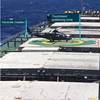China's Shandong Starts Releasing Oil Stranded at Ports after Inspections, Sources Say
China's Shandong refining hub has begun releasing millions of barrels of oil that were stuck at ports after inspections curbed imports into the province, trading sources said following a meeting this week between officials and refiners.
The easing of curbs placed on China's top oil importing province in mid-April will help free up inflows of heavy crude from Venezuela and Iran, they said.
In a meeting hosted by the Shandong government on Tuesday between customs officials and independent refiners, authorities revealed measures that will allow cargoes to be released from storage tanks, four sources with knowledge of the meeting said.
Chinese customs had tightened tanker inspections after several Iranian cargoes were found mislabeled as diluted bitumen, or bitumen mixture, to bypass oil import quotas that Beijing tightly controls.
The move held up millions of barrels of oil at storage sites and curbed new arrivals.
The Shandong government and Chinese customs did not immediately respond to requests for comment from Reuters.
Most of the stranded oil, estimated by three traders at over 10 million barrels, originated from Venezuela and Iran and was rebranded by traders as bitumen mixtures sourced from Malaysia to circumvent U.S. sanctions on the two exporters.
China's independent refiners, known as teapots, which account for more than a fifth of its crude imports and are mostly located in Shandong, have become top customers of Iranian and Venezuelan oil since late 2019 following tough U.S. sanctions on the two producers.
Authorities agreed this week to allow shipments that meet several key specifications of bitumen mixture to resume clearing customs as normal, provided that refiners also declare that they use the fuel only for bitumen production, traders said.
"The meeting paves the way for releasing the stranded oil and also freeing up future shipments," said one trader who attended the meeting.
"The unspoken reason for the relaxations was the government was concerned with falling tax revenues and import figures as the economy is already struggling," said the trader.
That means China's main intake of Venezuelan crude Merey, a typical feedstock long sought by Shandong plants for making road-paving bitumen, may resume normal inflows.
As part of the easing, other heavy crude oil that fails to meet the key quality standards of bitumen mix or fuel oil will be declared as "other heavy oil", which the sources said will smooth the inflow of Iranian heavy crude oil.
Neither bitumen mixture nor "other heavy oil" is subject to China's crude oil import quotas, but both are subject for 1,218 yuan ($168.26) per ton in consumption and import taxes.
Traders, however, cautioned that the new labeling should be a temporary move as otherwise it would once again derail Beijing's quota management of crude oil imports.
($1 = 7.2388 Chinese yuan renminbi)
(Reporting by Chen Aizhu)











